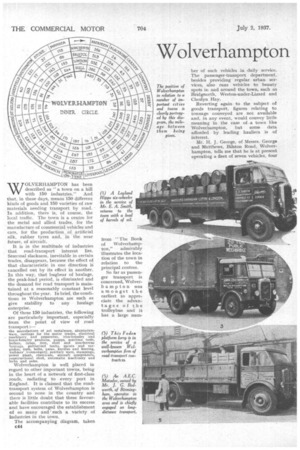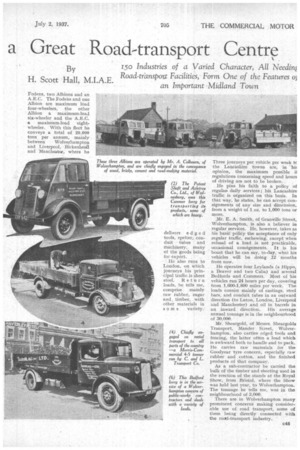Wolverhampton
Page 90

Page 91

If you've noticed an error in this article please click here to report it so we can fix it.
a Great Road-transport CentN 150 Industries of a Varied Character, All NeediN Road-tfanspott Facilities, Form One of the Features oj an Important Midland Town
By H. Scott Hall, M.I.A.E.
WOLVERHAMPTON has been described as "a town on a hill with 150 industries." And that, in these days, means 150 different kinds of goods and 150 varieties of raw materials needing transport by road. In addition, there is, of course, the local traffic. The town is a centre for the metal and allied trades, for the manufacture of commercial vehicles and cars, for the production of artificial silk, rubber tyres and, in the near future, of aircraft.
It is in the multitude of industries that road-transport interest lies. Seasonal slackness, inevitable in certain trades, disappears, because the effect of that characteristic in one direction is cancelled out by its effect in another. In this way, that bugbear of haulage, the peak-load period, is eliminated and the demand for road transport is maintained at a reasonably constant level throughout the year. In brief, the conditions in Wolverhampton are such as give stability to any haulage enterprise.
Of these 150 industries, the following are particularly important, especially from the point of view of road transport :— the manufacture of art metalware, aluminiumware, castings tor the motor trades, electrical machinery and apparatus, iron-foundry and brass-foundry products, pumps, machine tools, boilers, tubes, iron, steel and non-ferrous torgings, galvanized tanks, paints and varnishes, nuts, bolts, gates, hurdles and fencing, builders' ironmongery, sanitary ware, stampings, 'power plant, chemicals, aircraft components, constructional steel, automatic machinery and locks and safes.
Wolverhampton is well placed in regard to other important towns, being in the heart of a network of first-class roads, radiating to every port in England. It is claimed that the roadtransport system of Wolverhampton is second to none in the country and there is little doubt that these favourable facilities contribute to its success and have encouraged the establishment of so many and such a variety of industries in the town.
The accompanying diagram, taken c44 from "The Book of Wolverhampton," admirably illustrates the location of the town in relation to the principal centres.
So far as passenger transport is concerned, Wolverhampton was amongst the earliest to appreciate the advantages of the trolleybus and it has a large num her of such vehicles in daily service. The passenger-transport department, besides providing regular urban services, also runs vehicles to beauty spots in and around the town, such as Bridgnorth, Weston-under-Lizard and Glieslyn Hay.
Reverting again to the subject of goods transport, figures relating to tonnage conveyed are not available and, in any event, would convey little meaning in the case of _ a town like Wolverhampton, but some data afforded by leading hauliers is of interest.
Mr. H. J. George, of Messrs. George and Matthews, Bilston Road, Wolverhampton, tells me that he is at present operating a fleet of seven vehicles, four Fodens, two Albions and an A.E.C. The Fodens and one Albion are maximum load four-wheelers, the other Albion a maximum-load six-wheeler and the A.E.C. a maximum-load eightwheeler. With this fleet he conveys a total of 20,000 tons per annum, mainly between Wolverhampton and Liverpool, Birkenheall and Manchester, where he delivers edged tools, spelter, conduit tubes and machinery, many of the goods being for export.
Ile also runs to London, on which journeys his principal traffic is sheet steel. Return loads, he tells me, comprise mainly raw rubber, sugar end , timber, with other materials in
S ome variety.. Three journeys per vehicle per week tc the Lancashire towns are, in 'hi: opinion, the maximum possible ii regulations concerning speed and hours of driving are not to be broken.
He pins his faith to a policy of regular. daily services ; his Lancashire traffic is organized on this basis. In that way, he states, he can accept consignments of any size and dimension, from a weight of 1 oz. to 1,000 tons or more.
Mr. E. A. Smith, of Granville Street, Wolverhampton, is also a believer in regular services. He, however, takes as his basic policy the acceptance of only regular traffic, eschewing, except when refusal of a load is not practicable, occasional consignments. It is his boast that he can say, to-day, what his vehicles will be doing 12 months from now.
He operates four Leylands (a Hippo, a Beaver and two Cubs) and several Bedfords and Cornmers. Most of his vehicles run. 24 hours per day, covering from 1,600-1,800 miles per week. The loads consist mainly of castings, steel bars, and Conduit tubes in an outward direction (to Luton, London, Liverpool and Manchester) and oil in barrels in an inward direction. His average annual tonnage is in the neighbourhood of 30,000.
Mr. Sheargold, of Messrs. Sheargolds Transport, Mender Street, Wolverhampton, also carries edged tools and fencing, the latter often a load which is awkward both to handle and to pack. He carries raw materials for the Goodyear tyre concern, especially raw rubber and cotton, and the finished products of that company.
As a sub-contractor he carried the bulk of the timber and sheeting used in the erection of the stands at the Royal Show, from Bristol, where the Show was held last year, to Wolverhampton. The tonnage he tells me, was in the neighbourhood of 3,000.
There are in Wolverhampton many prominent concerns making considerable use of road transport, some of them being directly connected with the road-transport industry. •




















































































































































